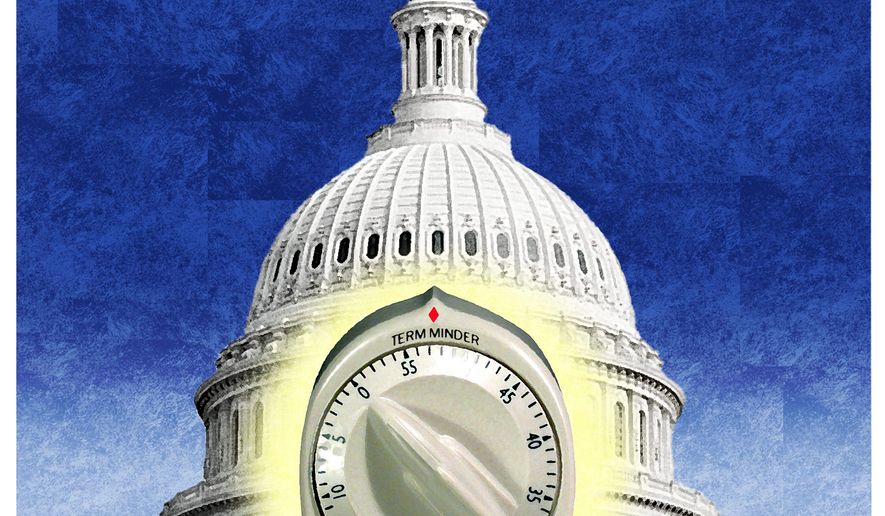OPINION:
One of the ironies of the impeachment of President Trump is just how similar the cast of characters is to those in the impeachment of Bill Clinton. By the time the trial was over, Nancy Pelosi, Jerry Nadler, Maxine Waters, Lindsay Graham, and 80 other members of Congress had cast a vote. And what is obvious is that the same players have been acting out for decades. When will things change?
Let’s face the facts: Washington politicians and bureaucrats arrive in the swamp and become entrenched. The longest-serving members of Congress have served for more than 45 years, and there are 44 congressional districts in which the age of the representative is more than double the median age of their constituents.
Incumbents, of course, have a defined advantage in this: In 2016, 97 percent of representatives were reelected. So if Americans want solutions at the highest levels of government, we should be demanding fresh leadership on a regular basis: Politicians and government officials should be subject to a short tenure before returning to civilian life through term limits.
Modern problems demand modern solutions. Aging seniors grilling tech gurus about privacy, emerging technologies and consumer rights have become a national joke. More concerning, tech illiteracy is yielding bad legislation that puts American security at risk.
Yet, the only thing the opposition party can offer judging by the Democratic presidential candidate lineup is more of the same, with candidates claiming long careers contributing to the swamp. Elizabeth Warren is in her eighth year in Washington, and she’s competing for the Oval Office against Bernie Sanders, who’s been an elected official since 1981.
Both are looking to extend their stay in Washington, whether as president or through a continued Senate tenure. Joe Biden, another candidate, first took public office 50 years ago, in 1970. Fresh names and fresh ideas, on both the right, with Donald Trump, and the left, with Pete Buttigieg, have already won the first caucus of 2020. Americans are clearly hungry for something new.
Term limits could be one viable measure to prevent career politicians. It’s an idea that has been promoted by Mr. Trump with varying degrees of enthusiasm. The struggle, of course, lies in the fact that members of Congress would have to be willing to vote themselves out of a job.
Removing career politicians, regardless of their success or good will, ensures that the job is in the service of the people rather than in pursuit of greater net worth. But term limits would only solve a part of the problem. Beyond elected officials, there are more than 2.1 million federal employees propping up the status quo.
The vast web of bureaucrats who staff the federal government’s many administrative branches have an even longer tenure than Congress. The most tenured Washington bureaucrat has been working for the government since 1942. No matter how perfect a civil servant’s record on the job, longevity itself must be addressed.
The administrative state enables bureaucrats to write rules, direct policy and impact the lives of everyday Americans. Yet, voters can’t vote this vast workforce out of office. Federal employees are difficult to remove, and often the will to remove them isn’t there. A 2013 study by the office for governmental accountability found that only 0.18 percent of employees were terminated in 2013, roughly 10 percent the rate of the private sector.
Mr. Trump has often pledged to “drain the swamp,” but he has yet to follow through on that campaign promise. The number of federal employees has remained relatively consistent since the 1950s and held steady through the Trump presidency. Federal tenure rules make it increasingly difficult to remove low performers. It doesn’t seem to matter who’s in office, or from what party — these career bureaucrats continue to exert power.
This unchecked control is especially troubling when it involves sensitive information concerning national security. In 2017, officials with anonymity confessed that intelligence agencies routinely withheld information from the commander-in-chief, asserting authority as independent actors not beholden to elected officials or the American people.
That some longtime politicians and bureaucrats may be acting in the best interests of the people doesn’t negate the larger point: Those who contribute to the swamp far outnumber honest civil servants. Simply put, governance should not be a career; it should be temporary and in service to the public. Short tenures are the way to do just that, since they’ve historically served to keep the size of government power in check.
Whoever wins in November, though, is unlikely to make a difference in that regard. For Congress and the Washington Machine, history has shown that the White House won’t impact business as usual.
But things need to change — from term limits to an end to federal tenure. Abbreviated careers in government would ensure the will of the people informs the highest levels of government.
Let’s show swamp dwellers the door.
• Conner Drigotas is the director of communications at a national law firm and a Young Voices contributor.




Please read our comment policy before commenting.